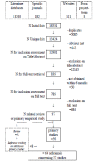Perspectives on care and communication involving incurably ill Turkish and Moroccan patients, relatives and professionals: a systematic literature review
- PMID: 22985103
- PMCID: PMC3517329
- DOI: 10.1186/1472-684X-11-17
Perspectives on care and communication involving incurably ill Turkish and Moroccan patients, relatives and professionals: a systematic literature review
Abstract
Background: Our aim was to obtain a clearer picture of the relevant care experiences and care perceptions of incurably ill Turkish and Moroccan patients, their relatives and professional care providers, as well as of communication and decision-making patterns at the end of life. The ultimate objective is to improve palliative care for Turkish and Moroccan immigrants in the Netherlands, by taking account of socio-cultural factors in the guidelines for palliative care.
Methods: A systematic literature review was undertaken. The data sources were seventeen national and international literature databases, four Dutch journals dedicated to palliative care and 37 websites of relevant national and international organizations. All the references found were checked to see whether they met the structured inclusion criteria. Inclusion was limited to publications dealing with primary empirical research on the relationship between socio-cultural factors and the health or care situation of Turkish or Moroccan patients with an oncological or incurable disease. The selection was made by first reading the titles and abstracts and subsequently the full texts. The process of deciding which studies to include was carried out by two reviewers independently. A generic appraisal instrument was applied to assess the methodological quality.
Results: Fifty-seven studies were found that reported findings for the countries of origin (mainly Turkey) and the immigrant host countries (mainly the Netherlands). The central themes were experiences and perceptions of family care, professional care, end-of-life care and communication. Family care is considered a duty, even when such care becomes a severe burden for the main female family caregiver in particular. Professional hospital care is preferred by many of the patients and relatives because they are looking for a cure and security. End-of-life care is strongly influenced by the continuing hope for recovery. Relatives are often quite influential in end-of-life decisions, such as the decision to withdraw or withhold treatments. The diagnosis, prognosis and end-of-life decisions are seldom discussed with the patient, and communication about pain and mental problems is often limited. Language barriers and the dominance of the family may exacerbate communication problems.
Conclusions: This review confirms the view that family members of patients with a Turkish or Moroccan background have a central role in care, communication and decision making at the end of life. This, in combination with their continuing hope for the patient's recovery may inhibit open communication between patients, relatives and professionals as partners in palliative care. This implies that organizations and professionals involved in palliative care should take patients' socio-cultural characteristics into account and incorporate cultural sensitivity into care standards and care practices.
Figures
References
-
- Francke AL. Palliative care for terminally ill patients in the Netherlands. Dutch Government Policy. Dutch Ministry of Health, Welfare and Sport, The Hague; 2003.
-
- WHO. Palliative care. 2011. Available from: http://www.who.int/cancer/palliative/en/ (accessed: 2011)
LinkOut - more resources
Full Text Sources
Miscellaneous


